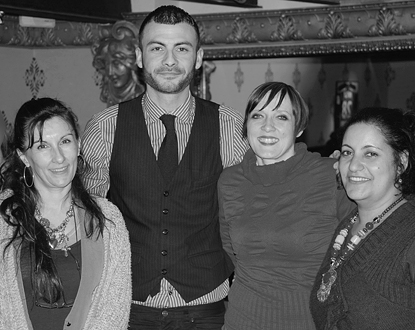Over six months, the Collective of Certified Psychotherapists organized “K fait psy” events. An initiative that proved successful: around 460 people attended these monthly meetings. The goal? To exchange, reflect, and discuss defined themes such as love, Art Therapy, crisis, etc. On the occasion of the 50th anniversary of Jung’s passing, the association decided to pay tribute to him on September 10, 2011, by organizing a symposium to explore his current relevance. Fabien Berrais, the spokesperson for the association, explains what motivated this choice.
Fifty years ago, Jung left us with theories still rich in meaning. All these objectives aimed at working on our unconscious, listening to intuition, finding meaning, and connecting to our spiritual dimension are owed to this Swiss-born psychiatrist. To reach his conclusions, the founder of “analytical psychology” (exploration of the unconscious) conducted a true introspection and traveled to other continents to learn about different cultures and traditions.
To commemorate his passing, the Nice Collective of Certified Psychotherapists is organizing a symposium on September 10, 2011, entirely dedicated to his current significance. The association, which advocates for the psychiatrist’s ideas, aims to launch an anti-dogmatic Jungian movement in the region without rejecting other forms of therapy: “Even though we identify as Jungians, we also draw on Freud, Lacan, and Gestalt Therapy,” stresses Fabien Berrais, President and spokesperson of the association and also a psychotherapist. “We don’t oppose Freudians; we complement them. We all complement each other,” he continues. Jung expressed this idea of complementarity in his writings when he stated, “I especially don’t want people to call themselves Jungians.”
Ideas that explain the theme of this symposium
The renowned psychiatrist continues to captivate. “I have very few mentors, and I believe Jung is one of them,” confides Fabien Berrais. This is one of the reasons it was important for him to dedicate this symposium to Jung. “For me, his great strength lies in the archetype and the symbols.” According to the Swiss psychiatrist, there are universal forms in the unconscious, called archetypes, that we possess even before birth. We are all bisexual, at least psychically, to him. Every woman has a part of masculinity: the animus, the masculine archetype within her. Conversely, every man holds a part of femininity, the anima, the feminine archetype. The archetype is part of the collective unconscious. Unlike Freud, who relied solely on the individual unconscious, where repressed and forgotten parts of each person reside, his disciple Jung developed the concept of the collective unconscious. Common to all, it represents the heritage of the human species’ evolution.
Another reason for Fabien Berrais’s interest in Jung: the principle of the “self,” another archetype. For Jung, this personality component represents both the conscious and the unconscious. The objective? To connect the conscious with the unconscious and vice versa. We have a lifetime to explore these two psychoanalytic functions of the personality. For example, some children born into a family of doctors have their future already “mapped out.” To uphold tradition, they will become doctors. Here, the conscious comes into play, while their unconscious leads them toward an artistic path. “For example, the self wants me to be an artist. Every time I try to be a doctor, it will lead me to failure. And each time I move toward an artistic path, the self will create synchronistic events that fit,” explains Fabien Berrais. Synchronicity is another notion, entirely irrational, developed by Jung. It involves at least two events with no causal connection but whose association holds meaning for the person perceiving them. This phenomenon explains “meaningful coincidences” according to its inventor.
While Jung’s work significantly focused on the unconscious, he also developed the four functions of conscious orientation: thinking, feeling, sensation, and intuition. Spontaneously, we heavily use one function while neglecting another. They work in pairs, depending on the individual. Thus, there are introverted intuitives and extroverted sensitives. “It’s very interesting in terms of work and self-awareness,” notes Fabien Berrais. For example, if a person operates predominantly with thinking, the therapist may suggest working on their emotional life, and vice versa. Conversely, a person who heavily relies on intuition will work on the five senses, the tangible, and vice versa. It’s simply a matter of rebalancing through deficiency.
An Educational Event
Under the presidency of Jung’s representative in France, Michel Cazenave, speakers like Carole Sédillot, a symbolism and mythology trainer, lecturer, and writer, will present the current relevance of Jungian thought from various perspectives. In total, there will be five presenters sharing insights into Jungian thought. “Everyone will contribute their piece,” shares Fabien Berrais. This symposium has two missions: to provide reflection avenues and answers, offering an average person a different perspective, as well as addressing professionals by bringing them reflective tools. Fabien Berrais observes that “many practitioners tend to isolate themselves in their offices, not necessarily engaging in continuing education and not updating their reflective processes.” Due to the evolution of people, society, and needs, it is essential that therapists also evolve to better aid their patients.
This symposium inherits the concept of “K fait psy.” Sixty-four individuals have already been won over by the idea. To participate, registration is recommended, as there are 88 available spots. This event invites self-reflection and listening to others, even if their viewpoints differ, as each individual is unique. An idea that aligns with Jung’s individuation process, which involves becoming unique while being part of a whole, including the world…


